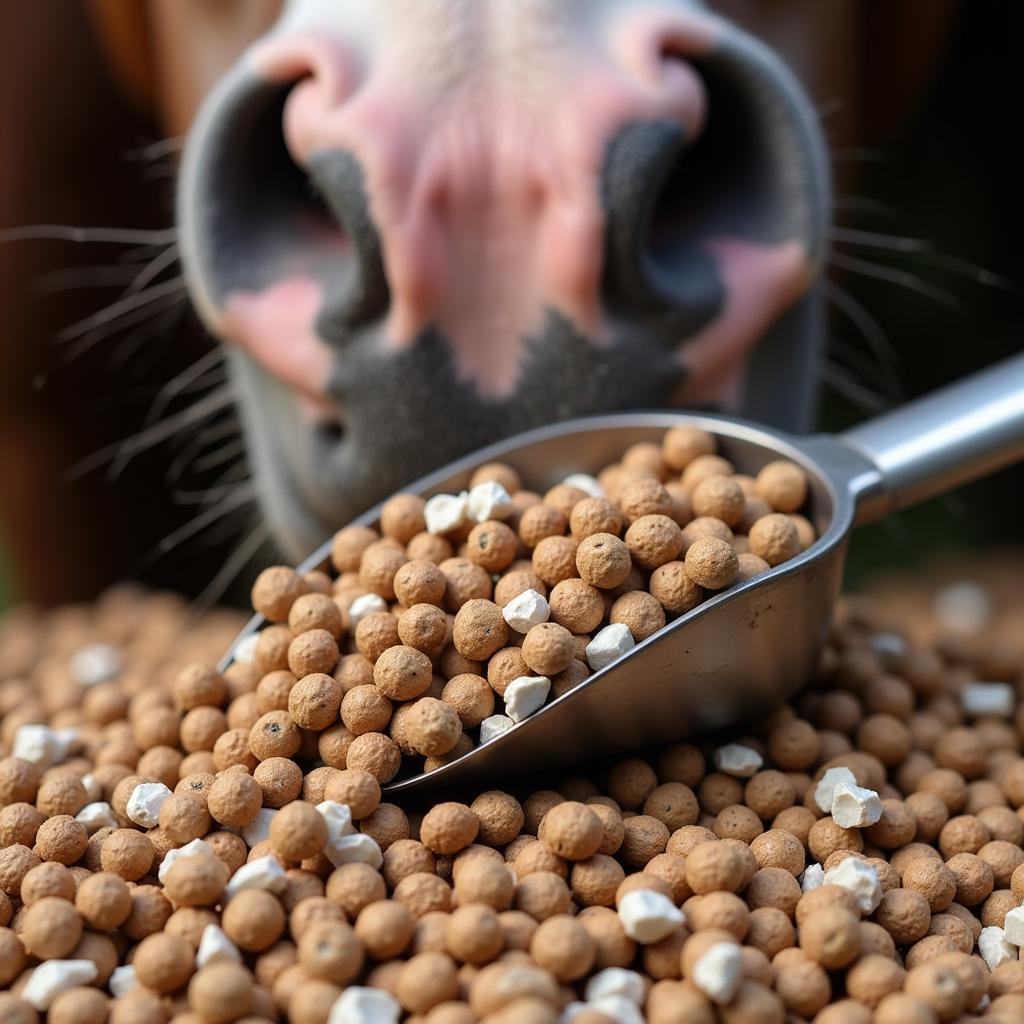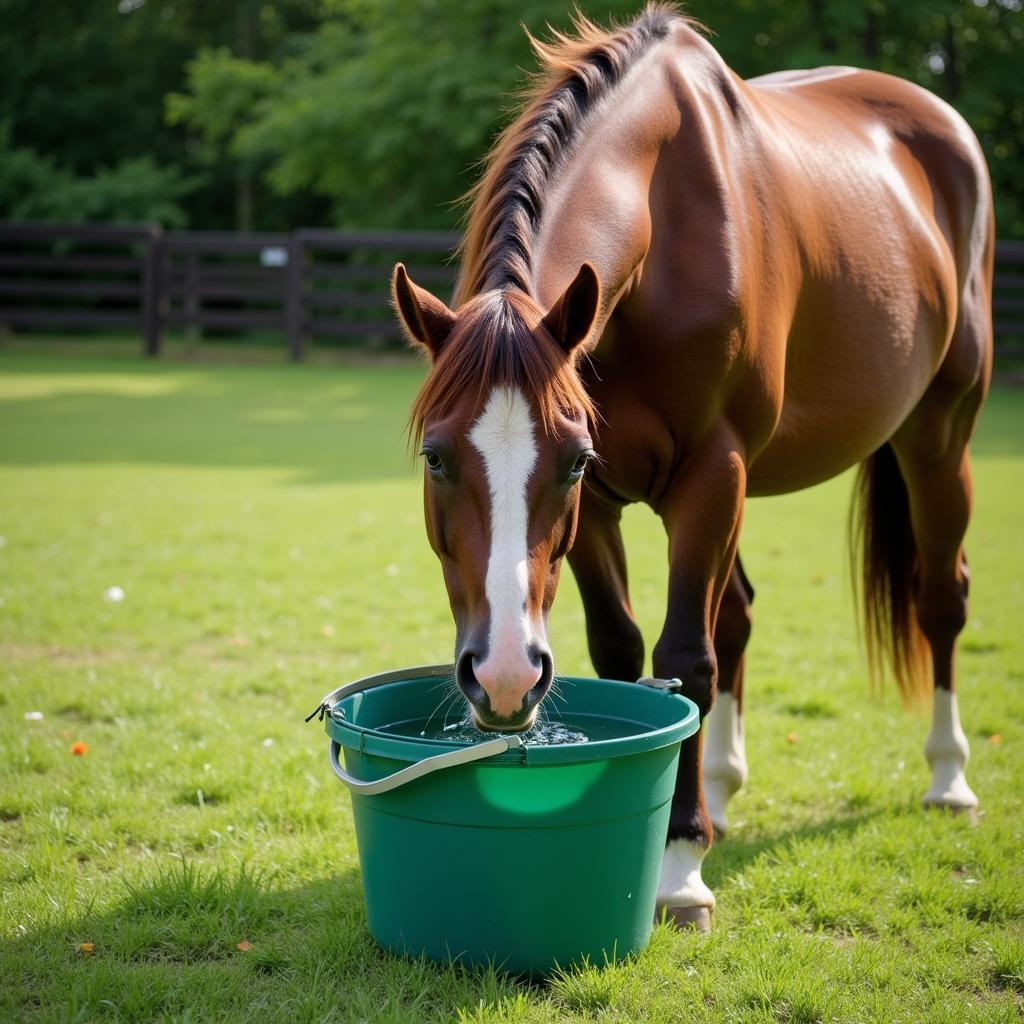Pelleted Electrolytes For Horses are a convenient and effective way to replenish essential minerals lost through sweat. Whether your equine partner is a high-performance athlete or enjoys leisurely trail rides, understanding the role of electrolytes in equine health is crucial.
Why are Electrolytes Important for Horses?
Electrolytes are minerals that carry an electrical charge when dissolved in fluids like blood, sweat, and saliva. They play a vital role in various bodily functions, including:
- Muscle function: Electrolytes like sodium, potassium, and chloride help regulate muscle contractions and nerve impulses.
- Hydration: Electrolytes help maintain fluid balance within the body, crucial for preventing dehydration.
- Acid-base balance: Electrolytes contribute to maintaining a stable pH level in the horse’s body.
 Horse eating pelleted electrolytes
Horse eating pelleted electrolytes
When Do Horses Need Electrolyte Supplementation?
Horses lose electrolytes through sweat, especially during strenuous activity, hot weather, or illness. Signs of electrolyte deficiency can be subtle but may include:
- Decreased performance: Lethargy, muscle weakness, and reduced stamina.
- Dehydration: Loss of appetite, dry gums, and sunken eyes.
- Muscle problems: Muscle cramping, tying-up, and reluctance to move.
- Behavioral changes: Depression, lethargy, and lack of coordination.
Benefits of Pelleted Electrolytes
While electrolytes are available in various forms, such as powders and pastes, pelleted electrolytes offer unique advantages:
- Convenience: Easy to measure and administer, especially for horses that are picky eaters.
- Palatability: Many horses find the taste of pelleted electrolytes appealing.
- Reduced waste: Unlike powders, pellets are less likely to be blown away or spilled.
- Controlled intake: Pellets allow for precise dosage control, ensuring your horse receives the correct amount of electrolytes.
Choosing the Right Pelleted Electrolytes
When selecting pelleted electrolytes for your horse, consider the following factors:
- Electrolyte content: Look for products with balanced ratios of sodium, chloride, potassium, calcium, and magnesium.
- Quality of ingredients: Choose reputable brands that use high-quality ingredients and avoid unnecessary additives or fillers.
- Your horse’s needs: Consider your horse’s activity level, health status, and sweating patterns.
How to Feed Pelleted Electrolytes
Follow these guidelines for safe and effective electrolyte supplementation:
- Consult your veterinarian: Determine the appropriate dosage and frequency based on your horse’s individual needs.
- Introduce gradually: Start with a small amount and gradually increase to the recommended dosage.
- Provide fresh water: Always ensure your horse has access to clean, fresh water, especially when supplementing electrolytes.
- Monitor your horse: Observe your horse for any adverse reactions and adjust the dosage or product if needed.
Pelleted Electrolytes vs. Other Forms
While pelleted electrolytes offer numerous benefits, other forms like powders and pastes can be suitable in certain situations:
- Powders: Economical and easily mixed with feed or water, but can be messy and less palatable for some horses.
- Pastes: Convenient for single-dose administration, particularly during travel or competition, but can be more expensive than pellets.
 A thirsty horse drinking water from a bucket
A thirsty horse drinking water from a bucket
Conclusion
Pelleted electrolytes are a valuable tool for horse owners to support their equine partners’ health and performance. By understanding the importance of electrolytes and choosing the right product for your horse’s needs, you can help maintain optimal hydration, muscle function, and overall well-being. Always consult with your veterinarian for personalized advice and guidance on electrolyte supplementation.
Frequently Asked Questions (FAQs)
1. Can I give my horse pelleted electrolytes every day?
It’s generally not recommended to provide electrolyte supplementation daily unless your horse is sweating excessively or under the guidance of a veterinarian.
2. How can I tell if my horse is dehydrated?
Signs of dehydration include dry gums, sunken eyes, loss of appetite, and decreased urination. Perform the skin pinch test: gently pinch a fold of skin on your horse’s neck and release it. If the skin takes longer than 2 seconds to return to its normal position, your horse may be dehydrated.
3. Can I give pelleted electrolytes to my pregnant mare?
Electrolyte requirements may vary during pregnancy. It’s essential to consult with your veterinarian to determine the appropriate type and dosage of electrolytes for your pregnant mare.
4. My horse won’t eat pelleted electrolytes. What should I do?
Try mixing a small amount of pelleted electrolytes with your horse’s regular feed. You can also experiment with different flavors or brands to find one your horse prefers.
5. Are there any risks associated with over-supplementing electrolytes?
Yes, excessive electrolyte intake can lead to imbalances and health issues. Always follow your veterinarian’s recommendations for dosage and frequency.
Need More Help?
If you have further questions about pelleted electrolytes for horses or need help choosing the right product for your equine partner, don’t hesitate to contact us. Our team of equine experts is here to assist you. Call us at 0772127271, email us at [email protected], or visit our location at QGM2+WX2, Vị Trung, Vị Thuỷ, Hậu Giang, Việt Nam. We offer 24/7 customer support for all your equine needs.
You can find more informative articles about horse care and nutrition on our website. Learn about 10 horse feed and other essential topics.